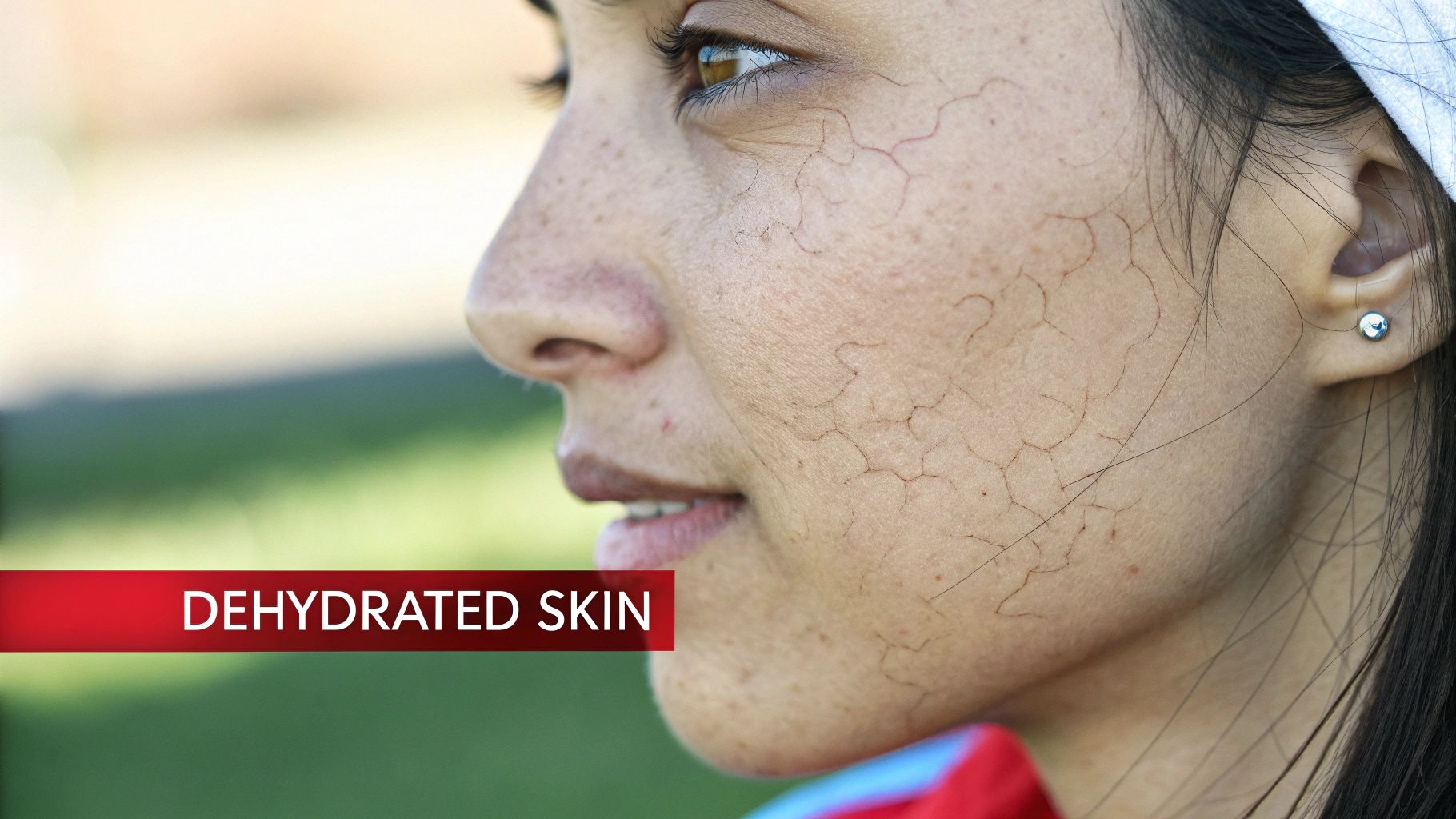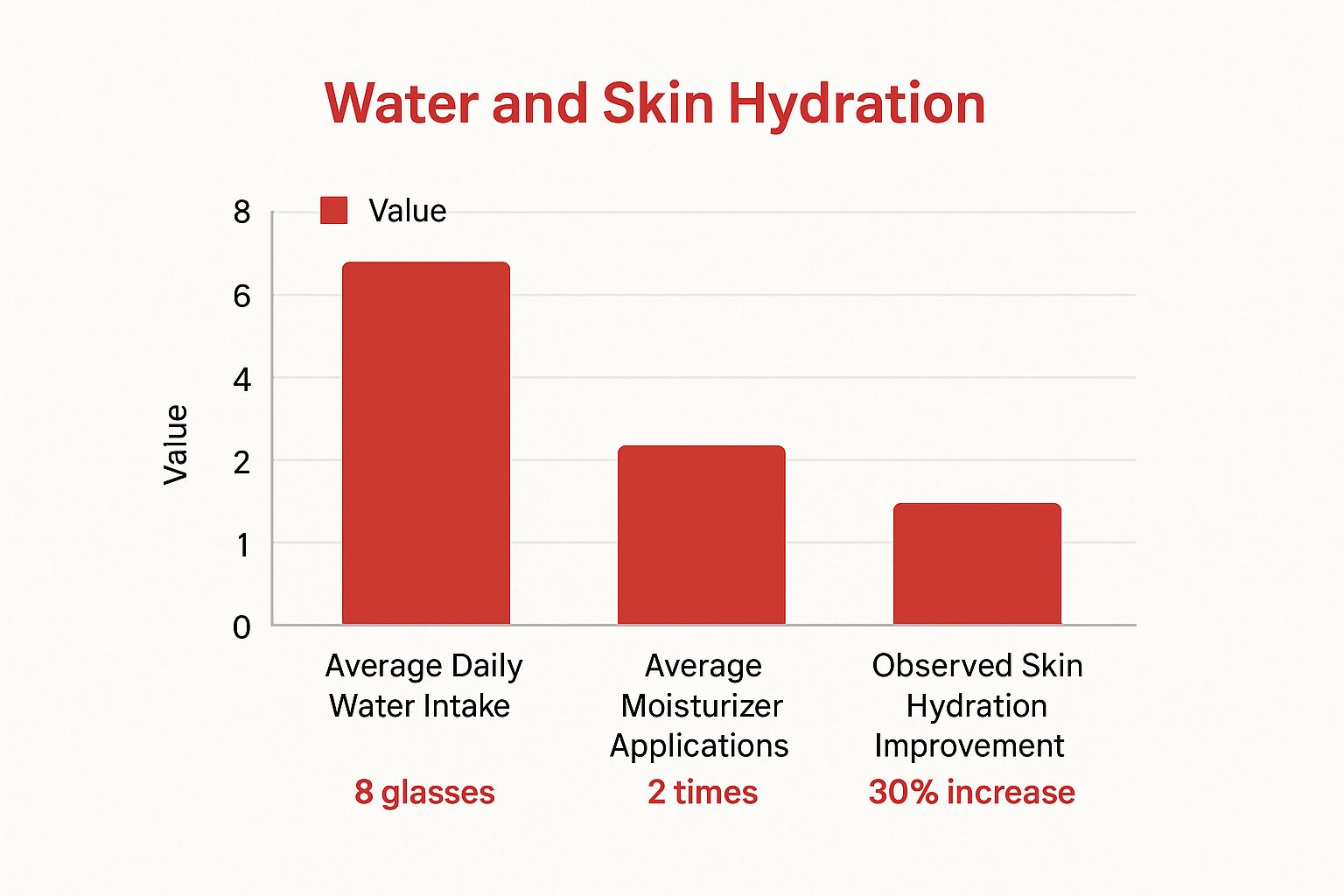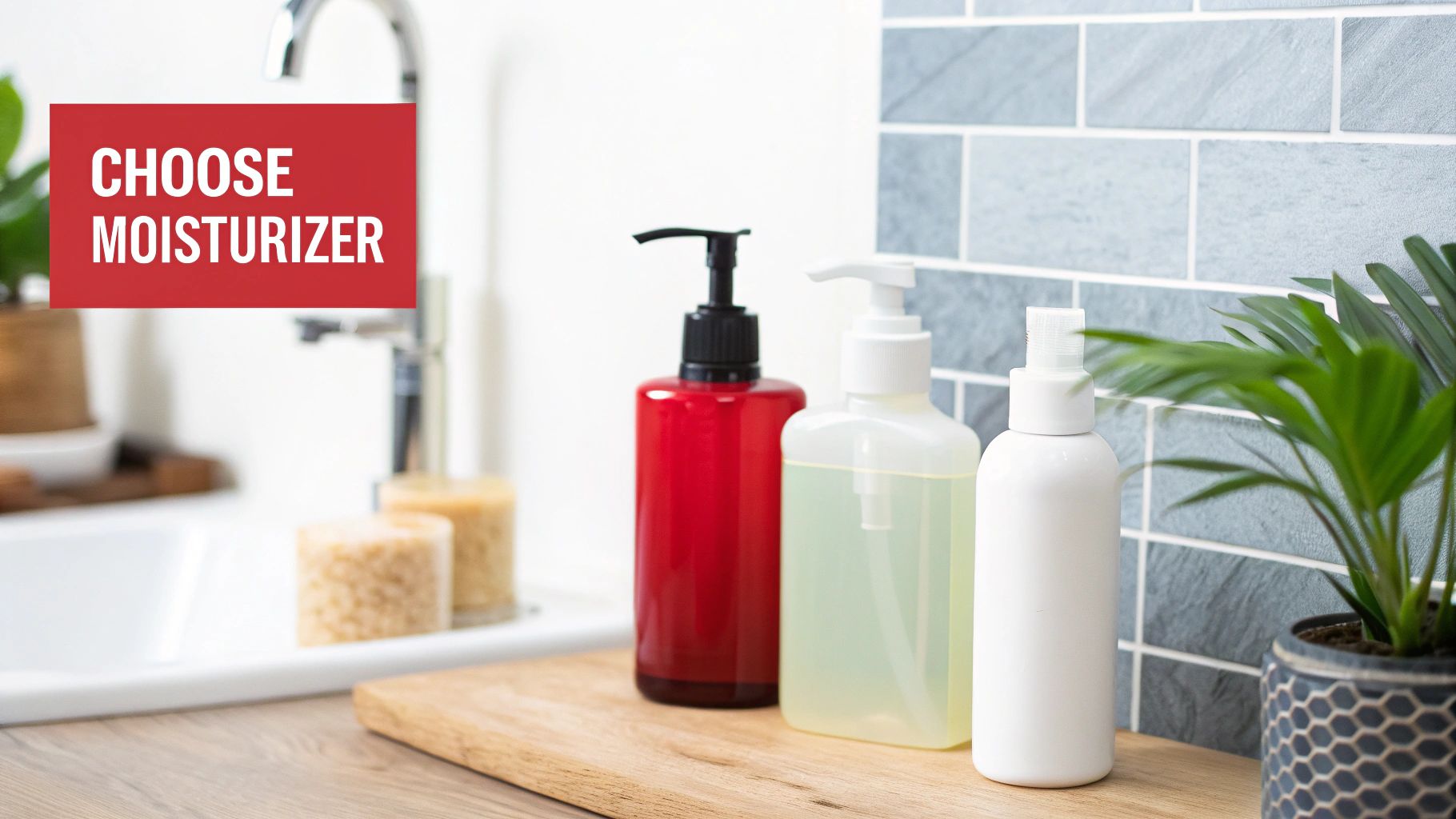
How To Treat Dehydrated Skin: Proven Solutions That Work
Share
Understanding What's Actually Happening to Your Skin

Let's dispel a common skincare myth: dehydrated skin isn't the same as dry skin. Dry skin is a skin type characterized by a lack of oil. Dehydrated skin, however, is a condition signifying a lack of water.
This fundamental difference is paramount in how you approach treatment. You might be diligently moisturizing, yet still feeling that tight, uncomfortable sensation. This could indicate your skin is dehydrated, not dry. For those with sensitive skin, understanding this difference is even more critical. Consider exploring how to master a skincare routine for sensitive skin.
Why Your Skin Feels Tight Despite Moisturizer
Dehydrated skin often feels tight because insufficient water weakens the protective barrier. Envision your skin's barrier as a brick wall. The bricks represent skin cells, and water and oils form the mortar holding them together.
When water is scarce, the “mortar” weakens, allowing moisture to escape and irritants to penetrate. This means even with moisturizer application, absorption and retention are compromised if your skin barrier is weakened.
Everyday Culprits Behind Dehydration
Many factors contribute to skin dehydration, often woven into our daily routines. Central heating, especially during colder months, creates dry air that saps moisture from your skin. Air conditioning has a similar effect.
Even simple pleasures like a cup of coffee can dehydrate. Stress also plays a significant role. Under stress, your body releases cortisol, a hormone that can disrupt skin barrier function and worsen dehydration. With a significant number of people experiencing skin conditions, the need for effective moisturizing routines is clear. It's fascinating to consider that the average person dedicates six weeks of their life to applying moisturizer! Delve deeper into the distinction between dry vs. dehydrated skin.
Recognizing the Subtle Signs
Identifying dehydration signs is crucial for effective treatment. Beyond tightness, dehydrated skin can appear dull and lackluster.
Fine lines and wrinkles may become more pronounced due to lost plumpness. Increased sensitivity, redness, or even flaking can also occur. Recognizing these subtle cues empowers you to create a targeted treatment plan.
The Game-Changing Ingredients That Actually Deliver Results
Forget the marketing hype. Let's talk real results for dehydrated skin. We'll explore the science-backed ingredients that go beyond surface hydration to address the root causes of moisture loss, giving you noticeable, lasting improvements.
Hyaluronic Acid: The Ultimate Hydration Hero
Hyaluronic acid is a natural substance found in our bodies, celebrated for its incredible water-binding abilities. Imagine it as a microscopic sponge, holding up to 1,000 times its weight in water. Applied topically, hyaluronic acid draws moisture from the air into your skin, plumping it up and softening the look of fine lines.
Ceramides: Reinforcing Your Skin's Protective Shield
Ceramides are lipids (fats) that naturally occur in your skin's outer layer, creating a vital protective barrier. This barrier is essential for preventing water loss and shielding against environmental aggressors like pollution and harsh weather. When ceramide levels are low, skin becomes dehydrated and prone to irritation. Replenishing them with ceramide-rich products reinforces this barrier, locking in moisture and boosting overall skin health.
Niacinamide: The Multi-Benefit Hydration Booster
Niacinamide, a form of vitamin B3, is a true skincare all-star. Besides its hydrating properties, it offers anti-inflammatory and antioxidant benefits. Niacinamide helps strengthen the skin's barrier, reduce redness, and improve overall tone. Look for products containing approximately 5% niacinamide for optimal hydration.
To understand how certain ingredients can impact skin hydration, take a look at the table below. It provides an evidence-based comparison and practical application guidance.
Proven Ingredients for Treating Dehydrated Skin
| Ingredient | How It Works | Effective Concentration | Best Application Time |
|---|---|---|---|
| Hyaluronic Acid | Attracts and binds water to skin cells | 1-2% | Morning and night |
| Ceramides | Replenishes the skin's natural barrier to prevent water loss | 0.5-2% | Morning and night |
| Niacinamide | Strengthens skin barrier, improves hydration and reduces inflammation | 2-5% | Morning and night |
| Glycerin | Humectant that draws moisture from the air to the skin | 5-10% | Morning and night |
This table highlights the power of combining potent ingredients to achieve optimal hydration. By understanding how each ingredient functions and its ideal concentration, you can choose products that effectively address your specific needs.

The infographic above illustrates the combined effect of daily water intake and moisturizer application on skin hydration. Consistent moisturizer use, coupled with regular water consumption, can significantly improve skin hydration, potentially by as much as 30%. These simple habits, practiced regularly, can lead to remarkable results.
Choosing the Right Formulas for Your Skin
When selecting products with these ingredients, prioritize quality over quantity. Opt for simple, effective formulas that minimize unnecessary additives or fragrances, as these can irritate sensitive skin. Introduce new products one at a time to gauge your skin’s reaction. Also, look for packaging that protects active ingredients from light and air degradation, ensuring their potency. This helps maximize hydration benefits and deliver lasting results for your dehydrated skin.
Creating Your Personal Hydration System That Sticks

Building a routine for effectively hydrated skin is a personal journey. It's about moving beyond general advice and creating a hydration system uniquely designed for your skin type, lifestyle, and budget.
Gentle Cleansing: The Foundation of Hydration
Beautiful, hydrated skin starts with proper cleansing. Harsh cleansers can strip away your skin's natural oils, making dehydration worse. Choose a gentle, pH-balanced cleanser instead. This will effectively remove impurities without damaging your skin’s protective barrier, which is essential for locking in moisture.
Layering for Maximum Absorption: A Step-by-Step Guide
Layering your skincare products is an art. It maximizes absorption and boosts the effectiveness of each product. Imagine building a wall, brick by brick. Begin with the thinnest consistency, such as a hydrating toner or essence. Then, apply serums with ingredients like hyaluronic acid or niacinamide. Finally, seal everything in with a moisturizer.
- Step 1: Hydrating Toner/Essence
- Step 2: Serum (Hyaluronic Acid/Niacinamide)
- Step 3: Moisturizer
This method ensures your skin receives the full benefits of each product, leading to optimal hydration.
Timing Matters More Than Product Overload
When it comes to skincare, timing is everything. Applying products at the right time can significantly enhance their effectiveness. For instance, applying hyaluronic acid to damp skin helps it attract and hold moisture more efficiently. A richer moisturizer at night provides deep hydration while you sleep, allowing you to wake up with refreshed and revitalized skin.
Adapting Your Routine: Seasonal and Lifestyle Changes
Your skin's needs change with the seasons and your lifestyle. In colder months, you might need a richer moisturizer to combat the drying effects of indoor heating. Increased stress can also affect your skin's barrier function, requiring adjustments to your routine. Being adaptable ensures your hydration system remains effective, no matter the circumstances.
Consistency Is Key: Building Sustainable Habits
Consistency is more powerful than the number of products you use. A simple, consistent routine is far more beneficial than a complex one you can't maintain. Find products you enjoy and dedicate time for your skincare. Make it a cherished part of your self-care ritual.
Troubleshooting and Seeking Support
Sometimes, even with the best intentions, your skin might not respond as you'd hoped. Don't give up! This is where troubleshooting becomes important. Try adjusting product application or the order in which you layer them. If dehydration persists, consider consulting a dermatologist. They can identify underlying issues and recommend personalized treatments.
Knowing When To Seek Professional Support
Taking consistent care of your skin at home is a fantastic first step towards managing dehydration. But sometimes, even the most dedicated routines need a little extra help. Knowing when to reach out to the experts can empower you to tackle those persistent skin concerns head-on.
Persistent Dehydration: When Home Remedies Aren't Enough
You’ve been diligent, incorporating hydrating heroes like hyaluronic acid and ceramides into your skincare routine. Yet, your skin still feels parched. If this sounds familiar, and especially if you're experiencing discomfort, inflammation, or persistent redness, it might be time to consult a dermatologist. You're not alone in seeking professional advice for skin concerns. In fact, a remarkable 94% of individuals dealing with dry skin have sought guidance from a healthcare professional, often in conjunction with regular emollient use. Learn more about these findings here.
Identifying Underlying Health Issues
Dehydrated skin isn't always a standalone issue. Sometimes, it can be a subtle sign of an underlying health condition like hypothyroidism or diabetes. If your skin dehydration is severe or accompanied by other symptoms—fatigue, excessive thirst, or unexplained weight changes, for example—it’s wise to consult your GP. They can perform the necessary tests to rule out any underlying medical factors contributing to your skin's condition.
Dermatology Consultations: What To Expect
Walking into a dermatology consultation can feel a bit like stepping into the unknown. Typically, it involves a thorough skin examination, along with a discussion of your medical history, lifestyle, and current skincare routine. Be prepared to talk about your symptoms, how long you’ve been experiencing dehydration, and any products you’re currently using. Your dermatologist may recommend specific tests, prescribe medications, or suggest lifestyle changes to boost your skin's hydration.
NHS Vs. Private Care: Navigating Your Options
In the UK, you have options when it comes to accessing dermatology services: the NHS or private practices. NHS services are generally free at the point of use, but often involve waiting lists. Private dermatologists offer quicker appointments, but consultations and treatments come with costs. Consider the urgency of your skin concerns, your budget, and how long you're comfortable waiting to determine which path is best for you.
Making Informed Decisions About Your Skin
Seeking professional support isn't a sign of defeat in your skincare journey. It's a proactive step towards addressing your needs comprehensively. Recognizing the limits of home remedies and understanding when expert advice is beneficial puts you in the driver's seat, empowering you to make informed decisions about your skin's health and overall well-being.
Products That Deliver Results Without Breaking the Bank
Finding the perfect skincare routine can feel overwhelming. So many products, so many promises! But achieving radiant, hydrated skin doesn't have to mean spending a fortune. Let's explore how to find effective treatments for dehydrated skin at every price point, from budget-friendly finds to luxurious investments.
Affordable Gems: Drugstore Discoveries That Shine
Some of the most effective skincare heroes are hiding in plain sight at your local drugstore. Brands like CeraVe and La Roche-Posay offer incredible moisturizers and cleansers packed with powerful ingredients like ceramides and hyaluronic acid. Often, these gems are priced significantly lower than their luxury counterparts. They prioritize effective formulas over fancy packaging, delivering real results without the premium price tag. CeraVe's Moisturizing Cream, for example, is a beloved classic known for its ability to restore the skin's protective barrier and soothe dryness. Proof that effective hydration doesn’t have to cost a fortune.
Premium Products: Investing in Skincare Excellence
While budget-friendly options are fantastic, some premium products do earn their higher price with cutting-edge formulations and delivery systems. Certain serums, for instance, utilize liposomal technology, encapsulating ingredients like vitamin C and hyaluronic acid in tiny spheres for deeper penetration. This targeted delivery can be a game-changer for persistent dehydration, offering a visible boost in moisture levels. Some premium brands also offer personalized consultations, providing tailored advice and product recommendations, adding significant value beyond the product itself. It's all about finding the right balance between cost and individualized skincare.
Smart Shopping: Making Every Drop Count
Building a skincare routine should be a journey, not a race. A gentle cleanser, a hydrating serum, and a good moisturizer are excellent starting points. Consider exploring resources like this guide on How to master a skincare routine for beginners. Try travel sizes or sample sachets to experiment before investing in full-sized products. This helps minimize waste and prevents costly mistakes. Prioritize products with proven ingredients like hyaluronic acid and ceramides. Don't be fooled by fancy packaging – focus on results. This mindful approach ensures you invest wisely in products that truly nourish your skin.
To help you in your journey, here’s a curated selection of products to consider:
Effective Dehydrated Skin Products by Category
| Product Type | Top Recommendation | Key Benefits | Price Point | Where to Find |
|---|---|---|---|---|
| Cleanser | CeraVe Hydrating Facial Cleanser | Gentle, non-foaming, removes impurities without stripping moisture | $ | Drugstores, online retailers |
| Serum | La Roche-Posay Hyalu B5 Serum | Plumps and hydrates with hyaluronic acid and vitamin B5 | $$ | Drugstores, online retailers |
| Moisturizer | CeraVe Moisturizing Cream | Restores skin barrier, provides long-lasting hydration | $ | Drugstores, online retailers |
| Premium Serum | Skinceuticals H.A. Intensifier | Multi-benefit serum boosts hyaluronic acid levels in skin | $$$ | Sephora, Dermstore |
| Premium Moisturizer | Augustinus Bader The Rich Cream | Luxurious moisturizer promotes cell renewal and hydration | $$$$ | Department stores, online retailers |
This table offers a starting point. Remember, what works best for one person might not work for another. Skincare is personal!
Synergistic Skincare: The Power of Product Pairing
Some product combinations work together beautifully to maximize hydration. Using a hydrating toner before applying a hyaluronic acid serum, for example, can boost the serum's ability to draw in and hold moisture. Layering a ceramide-rich moisturizer over a hydrating serum helps lock in that hydration and strengthen the skin’s protective barrier. This combined approach creates a powerful hydration system for lasting results.
Building Your Routine: Patience and Persistence are Key
Transforming your skin takes time and consistency. Don’t expect overnight miracles! Start with a few essential products and gradually introduce new ones as needed. Observe how your skin reacts and adjust your routine accordingly. This patient, personalized approach empowers you to create a truly effective hydration system tailored to your unique needs. Enjoy the process of discovering what works best for you, and celebrate the journey towards healthy, glowing skin.
The Hidden Factors Sabotaging Your Skin's Hydration

Your carefully chosen skincare routine is vital for keeping your skin hydrated, but there's more to the story. The reasons for persistently dry skin often lurk unnoticed in our everyday routines. Let's unveil these frequently missed factors and see how simple tweaks can significantly boost your skin's ability to hold onto moisture.
The Surprising Impact of Lifestyle on Hydration
Think about the air around you. Central heating, common in UK homes, generates dry air that continually pulls moisture from your skin. This means even if you regularly moisturize, your skin might still feel tight and dry. Air conditioning, though a welcome escape from summer's heat, also dries out the air.
Stress, a familiar companion in our busy lives, releases cortisol. This hormone can disrupt the skin's barrier function, affecting its capacity to retain moisture. Imagine your skin's barrier as a wall safeguarding a reservoir of water. Cortisol weakens this wall, letting the water escape and leaving your skin dehydrated. Read also: How to get naturally glowing skin.
Beyond Water: Nutrition and Your Skin's Moisture
Drinking enough water is crucial, but the food we eat also plays a role. Eating foods rich in essential fatty acids, such as oily fish and avocados, provides the building blocks for a healthy skin barrier. This makes your skin more resilient to moisture loss. Think of these fatty acids as strengthening the bricks in your skin’s protective wall.
Environmental Aggressors and Your Skin's Defences
Consider your surroundings. Pollution, harsh weather, and even long, hot showers can strip your skin of its natural oils, disrupting its delicate equilibrium. Just as excessive handwashing can dry out your skin, too much exposure to these environmental factors weakens your skin's ability to retain moisture.
Practical Strategies for Boosting Hydration From Within
Small, sustainable lifestyle changes can significantly improve skin hydration. It's not about radical changes, but thoughtful adjustments. Using a humidifier in winter can replenish moisture in the air, creating a more hydrating environment for your skin.
Managing stress through practices like mindfulness and yoga can help regulate cortisol levels, promoting a healthy skin barrier. Limiting hot showers to a few minutes and opting for lukewarm water helps preserve your skin's natural oils, essential for hydration. These simple yet effective strategies work in harmony with your skincare routine for a holistic approach to hydration, empowering your skin to thrive.
What's Next: Emerging Solutions Worth Watching
The skincare industry is constantly evolving, offering renewed hope for those of us in the UK seeking relief from dehydrated skin. With this constant drive for improvement, exciting new solutions are always just around the corner. Let's take a peek at some promising advances in skin hydration science.
Personalized Treatments and the Future of Hydration
Imagine skincare designed specifically for your unique genetic code. Personalized treatments driven by genetic testing are gaining momentum, offering the possibility of truly customized hydration solutions. This method could reshape how we approach dehydrated skin, transitioning from general advice to precise interventions tailored to individual needs.
Innovative Delivery Systems: Maximizing Ingredient Effectiveness
Along with personalized treatments, innovative delivery systems are emerging to enhance ingredient effectiveness. Consider liposomes, microscopic spheres that encapsulate active ingredients and transport them deep within the skin. This targeted approach can amplify the hydrating benefits of ingredients like hyaluronic acid and ceramides, promising more noticeable results. The global demand for effective skincare is clear, with the dry skin treatment market expected to achieve a remarkable USD 182.02 billion by 2030. For more detailed statistics, see this report.
The Skin Microbiome: A New Frontier in Hydration
Researchers are increasingly recognizing the vital role of the skin microbiome, the intricate ecosystem of microorganisms residing on our skin, in maintaining optimal hydration. Emerging studies indicate that a balanced microbiome is crucial for a healthy skin barrier, which, in turn, is key to preventing water loss. This new understanding is paving the way for innovative treatments that focus on fostering a thriving skin microbiome.
Upcoming Ingredients: Exploring Promising Early Results
The search for new hydrating ingredients never stops. While many are still in the initial phases of testing, some are showing impressive early promise, giving us a glimpse into the future of skincare. This continuous innovation keeps the industry dynamic and gives us hope for even more effective solutions in the years ahead. By staying informed, you can make educated choices about which innovations warrant your attention and investment.
LULUMINE Barrier-Repair Essentials: Gentle, Science-Backed Care for Resilient Skin
-
Sensitive Skin Oil-To-Milk Cleanser
A gentle, non-stripping cleanser that removes impurities while nourishing and soothing the skin—never leaving it tight or dry. -
Ceramide Hydrating Night Cream
Rich in ceramides and hydrating actives, this night cream helps restore and strengthen the skin’s natural barrier while you sleep. -
Niacinamide Gel Moisturiser
Lightweight yet deeply hydrating, this moisturiser supports barrier repair, reduces redness, and calms irritation with 5% niacinamide. -
Hydrating Serum
Delivers multi-molecular hyaluronic acid to replenish lost moisture and plump up dehydrated skin—essential for a resilient barrier. -
Natural Retinol Alternative Oil Serum
Powered by gentle plant-based actives like Bakuchiol, this serum supports renewal and repair without the irritation of traditional retinol.
Consistency is key—pair a gentle cleanser with a hydrating serum and a barrier-strengthening moisturizer for best results. Avoid harsh exfoliants and always finish with SPF during the day to protect your renewed skin.
